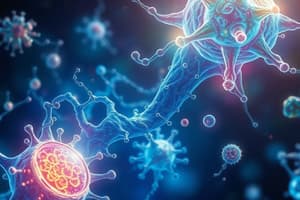Podcast
Questions and Answers
Which of the following cellular processes is LEAST directly involved in maintaining homeostasis in a single-celled organism?
Which of the following cellular processes is LEAST directly involved in maintaining homeostasis in a single-celled organism?
- Undergoing DNA replication in preparation for cell division. (correct)
- Breaking down waste products using lysosomes.
- Synthesizing enzymes to catalyze metabolic reactions.
- Regulating the transport of ions across the plasma membrane.
A scientist is studying a newly discovered organism. Which of the following characteristics would definitively classify it as a living organism, rather than a non-living entity?
A scientist is studying a newly discovered organism. Which of the following characteristics would definitively classify it as a living organism, rather than a non-living entity?
- It responds to external stimuli.
- It contains complex organic molecules.
- It replicates its genetic material with occasional errors. (correct)
- It can maintain a stable internal temperature.
If a mutation occurs during DNA replication that alters the sequence of a gene, which of the following is the MOST likely direct consequence?
If a mutation occurs during DNA replication that alters the sequence of a gene, which of the following is the MOST likely direct consequence?
- A change in the organism's genotype. (correct)
- The immediate death of the cell.
- The disruption of DNA replication.
- A change in the organism's phenotype.
A cell is exposed to a toxin that disrupts the function of the Golgi apparatus. Which of the following processes would be MOST directly affected?
A cell is exposed to a toxin that disrupts the function of the Golgi apparatus. Which of the following processes would be MOST directly affected?
Which of the following BEST describes the flow of genetic information as described by the central dogma of molecular biology?
Which of the following BEST describes the flow of genetic information as described by the central dogma of molecular biology?
In an experiment, a scientist removes the ribosomes from a cell. Which of the following processes would be MOST directly affected?
In an experiment, a scientist removes the ribosomes from a cell. Which of the following processes would be MOST directly affected?
A plant cell is placed in a hypertonic solution. Which of the following is MOST likely to occur?
A plant cell is placed in a hypertonic solution. Which of the following is MOST likely to occur?
A scientist discovers a new cell type that contains membrane-bound organelles, but lacks a defined nucleus. This cell would MOST likely be classified as:
A scientist discovers a new cell type that contains membrane-bound organelles, but lacks a defined nucleus. This cell would MOST likely be classified as:
Which of the following scenarios best illustrates natural selection?
Which of the following scenarios best illustrates natural selection?
What is the most inclusive level of ecological organization?
What is the most inclusive level of ecological organization?
How do viruses differ from bacteria?
How do viruses differ from bacteria?
Which of the following represents a structural adaptation of xerophytes for conserving water?
Which of the following represents a structural adaptation of xerophytes for conserving water?
Which hormone is primarily responsible for fruit ripening?
Which hormone is primarily responsible for fruit ripening?
Which of the following is NOT a key characteristic used to classify animals into different phyla?
Which of the following is NOT a key characteristic used to classify animals into different phyla?
What is the primary role of decomposers in an ecosystem?
What is the primary role of decomposers in an ecosystem?
Which organ system is responsible for protecting the body, regulating temperature, and providing a barrier against pathogens?
Which organ system is responsible for protecting the body, regulating temperature, and providing a barrier against pathogens?
How does the process of speciation typically occur?
How does the process of speciation typically occur?
If a scientist is investigating the function of the kidneys in maintaining proper salt balance in the blood, which field of study are they primarily working in?
If a scientist is investigating the function of the kidneys in maintaining proper salt balance in the blood, which field of study are they primarily working in?
Flashcards
Biology
Biology
The scientific study of life, exploring structure, function, evolution, and more.
Organization (in living things)
Organization (in living things)
All living things are highly ordered, from molecules to ecosystems.
Metabolism
Metabolism
Chemical reactions that obtain and use energy (e.g., photosynthesis).
Reproduction
Reproduction
Signup and view all the flashcards
Homeostasis
Homeostasis
Signup and view all the flashcards
Cell Theory
Cell Theory
Signup and view all the flashcards
DNA (Deoxyribonucleic Acid)
DNA (Deoxyribonucleic Acid)
Signup and view all the flashcards
Phenotype
Phenotype
Signup and view all the flashcards
Evolution
Evolution
Signup and view all the flashcards
Natural selection
Natural selection
Signup and view all the flashcards
Speciation
Speciation
Signup and view all the flashcards
Producers (Autotrophs)
Producers (Autotrophs)
Signup and view all the flashcards
Botany
Botany
Signup and view all the flashcards
Roots
Roots
Signup and view all the flashcards
Animals
Animals
Signup and view all the flashcards
Microbiology
Microbiology
Signup and view all the flashcards
Study Notes
The provided text contains no new information.
Studying That Suits You
Use AI to generate personalized quizzes and flashcards to suit your learning preferences.
Description
Explore the fascinating world of biology, the science of life. Learn about the key characteristics that define living organisms, from organization and metabolism to reproduction and adaptation. Discover the fundamental principles of cell biology.




